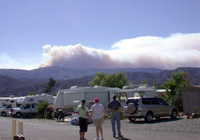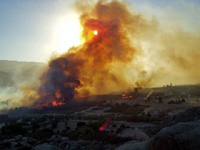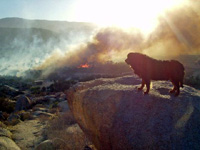| Major Disasters: NOW is the Time to Plan! by Alice Zyetz |
|
|
When
wildfires broke out recently near her RV park in Southern
California, Alice Zyetz discovered just how unprepared
she was for that disaster. What would you remember
to take if you had to evacuate rapidly in an emergency?
|
||
I spend part of the year at the Jojoba Hills RV Resort in Aguanga, Calif. Nobody had ever heard of our little community 13 miles east of Temecula until last month, when our name appeared in the news crawl of the Los Angeles TV stations during the Southern California firestorm. The "Roca Fire" wildfire was started when a motor home caught fire on Highway 371. Before it could be controlled it would burn 2334 acres and destroy several mobile homes, travel trailers and 32 vehicles. It also came licking up the hillside at the back of our park.
The RV park did have to evacuate for one night. Luckily we had no fire damage. A few RVs at the park experienced wind damage, but the biggest shock was finding out how unprepared so many of us were - even after 9/11, Hurricane Katrina and all the lessons we had supposedly learned. Even our park was unprepared. We discovered we did not have a good communication plan in place telling us when to leave and where to go. We do now!
I had only a few minutes to evacuate. I knew to take all my medications (but not copies of the prescription numbers) and the laptop computer with all of my writing projects. Luckily, I hadn't put away my classic Martin guitar after playing it the day before; I remembered to take it after stumbling over it. Took my neck pillow and change of clothes. At the last minute I remembered the charger for the cell phone. That's it. I forgot my file box of important records, the only photo montage I have of my parents, the flash drives with all my backup files.
After speaking with others, I discovered many of my fellow Jojobians had similar experiences. One man didn't even bring his ID. Another forgot his allergy medications. Although one person wished she had brought a radio and a flashlight, she made sure she didn't forget to bring the clothes she had packed for her cruise at the end of the month.
Full-time RVers take everything with them
Full-timers have it easier because their house is always with them. Dave and Sandy Baleria, personal safety and RVing lifestyle instructors for Life on Wheels RV Conferences, agree.
"We don't have to worry about cots in stadiums, hotels and motels, as full-time RVers," they say. "We are like turtles with our shells on our back, only faster -- but only if we pay attention to weather and events going on around us."
However, even for full-timers, an emergency could develop that would require them to abandon their rig at a moment's notice. The Balerias offer this advice:
"If you keep your valuables in a fire safe and have to abandon your RV, take the fire safe. That's what we do. We actually have three, two are briefcase size. They are small and light enough to take. Even if you are away from your rig and a wildfire burns your RV to the ground, your important papers are in the fire safe, so you still have not lost them."
Part-time RVers are more vulnerable to disasters
Although most part-time RVers have a second, smaller rig providing them the flexibility to move out of a danger area, they still must have an emergency plan. One couple from Jojoba jumped into their rig, but once they got away from the fire they discovered they had no extra clothing with them. Fortunately, Wal-Mart allowed many of our evacuees to park in their lot. Said couple paid for their "free" parking by going inside the store to buy underwear, toothbrushes and other necessities they had forgotten.
Sam, another evacuee, didn't share their concern. "I took my wife, my dog and the computer," he said. "I needed new underwear anyway."
Many of us didn't have time to get the second RV ready. I had neglected to start mine periodically while it was in storage. That night my battery was dead. Les couldn't take his because it was at the repair shop. The list goes on. We all learned a lesson: Be prepared!
The most important thing: preparedness
The time to plan for an emergency is before it happens. Thanks to Cindy Quigley, coordinator of Riverside County Emergency Services, for that advice. She gives the following advice for assembling a kit that can be grabbed on a moment's notice:
- On a flash drive or CD, record your Social Security number, driver's license number, and the policy information for your life, health and homeowners insurance. In addition, take photos of your belongings and save them to the flash drive.
- Assemble copies of important papers.
- Compile a list of contact information for your doctors, family and friends.
- Prepare a week's worth of your medications.
- Put together a personal hygiene kit.
- Set aside your favorite pillow and bedding, along with a change of clothes, flashlight, radio, and batteries.
- Make a kit for your pet(s). Include dry food, water dish, pooper scooper, and plastic bags.
The Red Cross is an invaluable asset
The Red Cross is not only organized to respond immediately to crises, it has compiled excellent guidelines to help you prepare for any disaster. Please take the time now to download the abundance of information available at the flick of your cursor.
The Red Cross has joined forces with other community-based organizations to build a Web site called Prepare.org, which brings you reminders about special planning needs for various segments of our population including seniors, people with disabilities, pet owners and families.
How you can help in future disasters
You can donate money or volunteer your time to the Red Cross to maintain its many excellent programs. Many RVers have gone through training and volunteer for three-week stints three times a year. Jeff Fryrear, a member of the Escapees RV Club that Jaimie and I belong to, is president of the 500-member subgroup called DOVEs (Disaster Operation Volunteer Escapees).
"RVers are in the fortunate position of being mobile and self-sufficient, so we can be ready to respond a lot quicker than many people," Jeff says. How does he summarize his experiences? "We often talk about DOVEs going to exotic places … at un-exotic times."
Because RVers are used to driving large vehicles, the Red Cross entrusts its fully equipped motor pool to them. DOVEs Julia and Fred Lyon share their experiences:
"At first we were trained to drive the mobile feeding trucks that went to the afflicted neighborhoods and served freshly cooked hot meals twice a day. Now we drive the Ford Excursions (donated by Ford) filled with all types of electronic equipment (also donated by major companies) so that we can set up a self-contained satellite system, even when there are no services."
Asked why they do this volunteer work, the Lyons say: "This country has been good to us. Now that we're retired, we can give a little bit back."
Finally, DOVE Joan Murphy, who volunteers with her husband, Terry, describes their experience giving assistance after Hurricane Katrina this way: "Looking out and seeing hundreds of Red Cross volunteers working their hearts out to give others hope and aid was an amazing and heart-warming view of humanity at its best."
Disasters will continue to happen, but you can be better prepared. And if you are lucky enough to escape damage and danger yourself, you can share your good fortune with others.
May the recent fire victims be able to rebuild their lives soon.
Alice Zyetz
11/16/07
(Links updated 12/4/2021, RTA)



